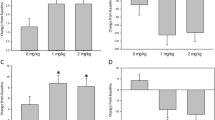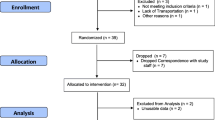Abstract
Despite speculation that sucrose consumption affects behavior, little empirical information is available. Accordingly, this study investigated the effect of sucrose consumption on the behavior of eight preschool children. Children were tested individually using a double-blind, crossover design. On separate mornings each child received 6 ounces of juice, sweetened on one morning with sucrose and on the other with an artificial sweetener. Children were observed for 90 minutes following the drinks, alternating between 15-minute sessions of work on structured tasks and 15-minute sessions of free play. Following the sucrose drink the children showed a decrement in performance in the structured testing situation, and they demonstrated more “inappropriate” behavior during free play. These differences in behavior were most pronounced approximately 45 to 60 minutes after the drinks. Thus, the study provides objective evidence in young children of a rather subtle, yet significant, time-dependent behavior effect of sucrose ingestion.
Similar content being viewed by others
References
Behar, D., Rapoport, J. L., Adams, A. J., Berg, C. J., & Cornblath, M. (1984). Sugar challenge testing with children considered behaviorally “sugar reactive.”Nutrition and Behavior, 1, 227–288.
Chiel, H., & Wurtman, R. (1981). Short term variations in diet composition change the patterns of spontaneous motor activity in rats.Science, 213, 676–678.
Conners, C. K. (1984). Nutritional therapy in children. In J. R. Galler (Ed.),Nutrition and behavior (pp. 159–191). New York: Plenum.
Conners, C. K., & Blouin, A. G. (1982/83). Nutritional effects on behavior of children.Journal of Psychiatric Research, 17, 193–201.
Conners, C. K., Wells, K. C., Horn, W. F., Blouin, A. G., Beerbohm, E. K., O'Donnell, D. J., Seidel, W. T., & Shaw, D. S. (in press). The effects of sucrose and fructose on classroom behavior of child psychiatric patients.Nutrition and Behavior.
Constantini, A. F., Corsini, D. A., & Davis, J. E. (1973). Conceptual tempo, inhibition of movement and acceleration of movement in 4-, 7-, and 9-year-old children.Perceptual and Motor Skills, 37, 779–784.
Crook, W. G. (1975). Food allergy-The great masquerader.Pediatric Clinics of North America, 22, 227–238.
Ferguson, H. B., Stoddart, C., & Simeon, J. G. (1986). Double-blind challenge studies of behavioral and cognitive effects of sucrose-aspartame ingestion in normal children.Nutrition Reviews, 44, 144–150.
Galler, J. R. (1984).Nutrition and behavior. New York: Plenum.
Kirk, R. E. (1968).Experimental design: Procedures for the behavioral sciences. Belmont, California: Brooks/Cole.
Klee, S. H., & Garfinkel, B. D. (1983). The computerized continuous performance task: A new measure of inattention.Journal of Abnormal Child Psychology, 11, 487–496.
Kolata, G. (1982). Food affects human behavior.Science, 218, 1209–1210.
Levy, F. (1980). The development of sustained attention (vigilance) and inhibition in children: Some normative data.Journal of Child Psychology and Psychiatry, 21, 77–84.
Lipton, M. A., Nemeroff, C. B., & Mailman, R. B. (1979). Hyperkinesis and food additives. In R. J. Wurtman & J. J. Wurtman (Eds.),Nutrition and the brain (Vol. 4, pp. 1–27). New York: Raven Press.
Maccoby, E. E., Dowly, E. M., Hagen, J. W., & Degerman, R. (1965). Activity level and intellectual functioning in normal preschool children.Child Development, 36, 761–770.
Miller, S. A. (1981).Nutrition and behavior. Philadelphia: Franklin Institute Press.
Morgan, K. I., & Zabik, M. E. (1981). Amount and food sources of total sugar intake by children ages 5 to 12 years.American Journal of Clinical Nutrition, 34, 404–413.
O'Banion, D., Armstrong, B., Cummings, R. A., & Stange, J. (1978). Disruptive behavior: A dietary approach.Journal of Autism and Childhood Schizophrenia, 8, 325–337.
Phlegar, F. L., & Phlegar, B. (1979). Diet and school children.Phi Delta Kappan, September, 162–165.
Pickens, J. M., Burkeholder, J. N., & Womack, W. N. (1967). Oral glucose tolerance test in normal children.Diabetes, 16, 11–14.
Prinz, R. J., Roberts, W. A., & Hantman, E. (1980). Dietary correlates of hyperactive behavior in children.Journal of Consulting and Clinical Psychology, 48, 760–769.
Rapp, D. (1978). Does diet affect hyperactivity?Journal of Learning Disabilities, 11, 56.
Riddle, D. B., & Prinz, R. (1984, August).Sugar consumption in young children. Paper presented at the Annual Convention of the American Psychological Association. Toronto.
Rosvold, H. E., Mirsky, A. F., Sarason, I., Bransome, E. D., & Beck, L. H. (1956). A continuous performance test of brain damage.Journal of Consulting Psychology, 20, 343–350.
Rumsey, J. M., & Rapoport, J. L. (1983). Assessing behavioral and cognitive effects of diet in pediatric populations. In R. J. Wurtman & J. J. Wurtman (Eds.),Nutrition and the brain (Vol. 6, pp. 101–161). New York: Raven Press.
U.S. Senate, Select Committee on Nutrition and Human Needs. (1977).Dietary goals for the United States (2nd. ed.). Washington, D.C.: U.S. Government Printing Office.
Warren, J. V. (1975). Medical and toxicological issues. InSweeteners: Issues and uncertainties, National Academy of Sciences Academy Forum, Fourth of a Series (pp. 36–40). Washington, D.C.: National Academy of Sciences.
Wolraich, M., Milich, R., Stumbo, P., & Schultz, F. (1985). Effects of sucrose ingestion on the behavior of hyperactive boys.Journal of Pediatrics, 106, 675–682.
Yokogoshi, H., Roberts, C. H., Caballero, B., & Wurtman, R. J. (1984). Effects of aspartame and glucose administration on brain and plasma levels of large neutral amino acids and brain 5-hydroxyindoles.American Journal of Clinical Nutrition, 40, 1–7.
Author information
Authors and Affiliations
Additional information
This research was funded in part by grants from the General Research Grants Committee, University Hospital, Boston University Medical Center, and from the University of Connecticut Research Foundation. The project was conducted at the Clinical Research Center, Massachusetts Institute of Technology (National Institute of Health/General Clinical Research Center Grant 5M01-RR00088-20). We would like to express our appreciation to the many staff members of the Clinical Research Center for their extensive cooperation in helping us to plan and carry out this study, and to the director and staff of Technology Children's Center for their assistance in helping us to reach interested families. We also would like to thank the parents and children who participated in the study. Portions of this paper were presented at the annual meeting of the American Psychological Association, Toronto, August 1984.
Rights and permissions
About this article
Cite this article
Goldman, J.A., Lerman, R.H., Contois, J.H. et al. Behavioral effects of sucrose on preschool children. J Abnorm Child Psychol 14, 565–577 (1986). https://doi.org/10.1007/BF01260524
Revised:
Issue Date:
DOI: https://doi.org/10.1007/BF01260524




